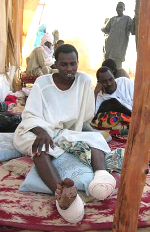Amnesty International calls for arms embargo on Khartoum
LONDON, Sept 21 (AFP) — Amnesty International, just back from a fact-finding mission to Sudan, called for an international arms embargo to be slapped on Khartoum as a way to stop ongoing atrocities in the Darfur region.
 Irene Kahn, secretary general of the London-based human rights group, said the Sudanese government was “in a state of denial” regarding Darfur, where the United Nations says 50,000 people have died and 1.5 million others displaced at the hands of militia gangs.
Irene Kahn, secretary general of the London-based human rights group, said the Sudanese government was “in a state of denial” regarding Darfur, where the United Nations says 50,000 people have died and 1.5 million others displaced at the hands of militia gangs.
“This is a crisis that is still going on,” Kahn told reporters in London. “People are being killed, raped and pushed out of their homes.”
Sudanese officials have said they are responding, albeit grudgingly, to a UN Security Council resolution, adopted last Saturday, threatening sanctions if President Omar al-Beshir’s government fails to restore peace in Darfur after 19 months of conflict.
Kahn, who led a seven-member delegation that toured Darfur and met officials in Khartoum, said tougher action is called for.
“We are asking for an arms embargo, which means a stoppage of the selling of arms,” she said, adding that there is “clear evidence” that the Sudanese armed forces, and not just so-called Janjaweed militia, have carried out atrocities.
“We think there is a practical problem in Darfur,” she said. “It is not a problem solved by United Nations wrangling on (other types of) sanctions … that will not work on the ground.”
Amnesty International also wants to see a substantial increase in the number of international observers in Darfur — there now are only eight, said Kahn — who can “name and shame” those responsible for atrocities while cataloging the names of victims and razed villages.
Kahn criticized UN acceptance of the concept of safe areas in Darfur for people fleeing danger, saying it amounted to a form of “ethnic re-engineering” by concentrating homeless victims of violence into designated areas indefinitely.
She also said the Amnesty fact-finders — who arrived in Sudan on September 14 — had found “very little sign” that Khartoum was fulfilling a pledge to crack down on what she called “government-controlled militia”.
“What we found (during two weeks in Sudan) was a picture of denial by the government, distress of the people and, on our side, disappointment that progress is being made so slowly, too little, too late,” Kahn said.
The war broke out in February 2003 when rebels rose up against Khartoum to demand an end to the marginalization of their region, one of the poorest in Sudan.
UN officials say pro-government Janjaweed militias have carried out a scorched-earth campaign of ethnic cleansing against non-Arab minorities over the past 19 months.
